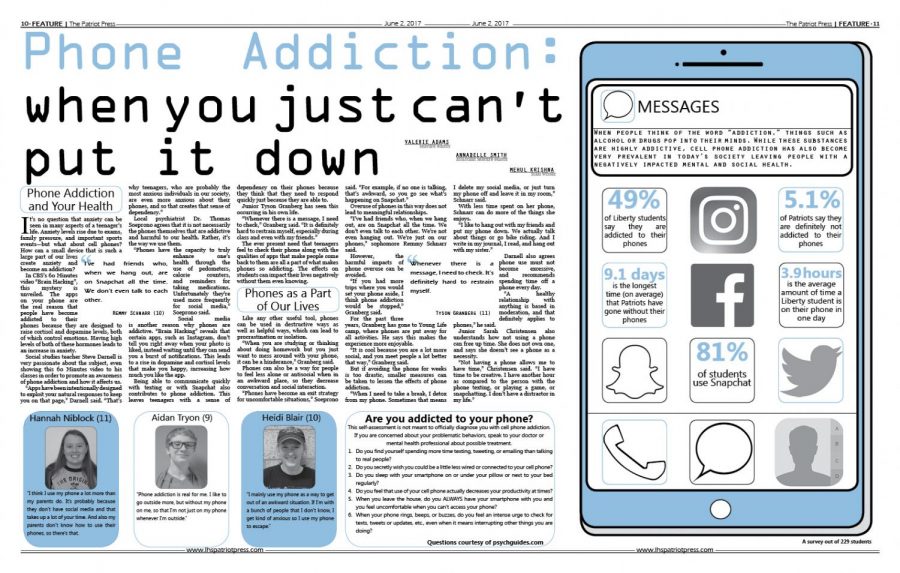Drugs, Alcohol…Phones?
When people think of the word “addiction,” things such as alcohol or drugs pop into their minds. While these substances are highly addictive, cell phone addiction has also become very prevalent in today’s society leaving people with a negatively impacted mental and social health.
June 6, 2017
Phone Addiction and Your Health
It’s no question that anxiety can be seen in many aspects of a teenager’s life. Anxiety levels rise from stressors like exams, family pressure, and important sports events — but what about cell phones? How can a small device that is such a large part of our lives create anxiety and become an addiction?
In CBS’s 60 Minutes video “Brain Hacking”, this mystery is unveiled. The apps on your phone are the real reason that people have become addicted to their phones because they are designed to raise cortisol and dopamine levels, both of which control emotions. Having high levels of both of these hormones leads to an increase in anxiety.
Social studies teacher Steve Darnell is very passionate about the subject and showed this 60 Minutes video to his classes in order to promote an awareness of phone addiction and how it affects us.
“Apps have been intentionally designed to exploit your natural responses to keep you on that page,” Darnell said. “That’s why teenagers, who are probably the most anxious individuals in our society, are even more anxious about their phones, and so that creates that sense of dependency.”
Local psychiatrist Thomas Soeprono agrees that it is not necessarily the phones themselves that are addictive and harmful to our health. Rather, it’s the way we use them.
“Phones have the capacity to truly enhance one’s health through the use of pedometers, calorie counters, and reminders for taking medications. Unfortunately they’re used more frequently for social media,” Soeprono said.
Social media is another reason why phones are addictive. “Brain Hacking” reveals that certain apps, such as Instagram, do not notify you right away when your photo is liked, instead waiting until they can send you a burst of notifications. This leads to a rise in dopamine and cortisol levels that make you happy, increasing how much you like the app.
Being able to communicate quickly with texting or with Snapchat also contributes to phone addiction. This leaves teenagers with a sense of dependency on their phones because they think that they need to respond quickly just because they are able to.
Junior Tyson Granberg has seen this occurring in his own life.
“Whenever there is a message, I need to check,” Granberg said. “It is definitely hard to restrain myself, especially during class and even with my friends.”
The ever present need that teenagers feel to check their phone along with the qualities of apps that make people come back to them all contribute to phone addiction. The effects that these attributes have on students can affect their lives negatively without them even knowing.
Phones in Our Lives
Like any other useful tool, phones can be used in destructive ways as well as helpful ways, which can lead to procrastination or isolation.
“When you are studying or thinking about doing homework but you just want to mess around with your phone, it can be a hinderance,” Granberg said.
Phones can also be a way for people to feel less alone or antisocial when in an awkward place, so they decrease conversation and social interaction.
“Phones have become an exit strategy for uncomfortable situations,” Soeprono said. “For example, if no one is talking, that’s awkward, so you go see what’s happening on Snapchat.”
Overuse of phones in this way does not lead to meaningful relationships.
“I’ve had friends who, when we hang out, are on Snapchat all the time. We don’t even talk to each other. We’re not even hanging out. We’re just on our phones,” sophomore Remmy Schnarr said.
However, the harmful impacts of phone overuse can be avoided.
“If you had more trips where you would set your phone aside, I think phone addiction would be stopped,” Granberg said.
For the past three years, Granberg has gone to Young Life camp, where phones are put away for all activities. He says this makes the experience more enjoyable.
“It is cool because you are a lot more social, and you meet people a lot better that way,” Granberg said.
But if avoiding the phone for weeks is too drastic, smaller measures can be taken to lessen the effects of phone addiction.
“When I need to take a break, I detox from my phone. Sometimes that means I delete my social media, or just turn my phone off and leave it in my room,” Schnarr said.
With less time spent on her phone, Schnarr can do more of the things she enjoys.
“I like to actually hang out with my friends. I like to put my phone down, and we actually talk about things or go bike riding. And I write in my journal, I read, and hang out with my sister.”
Darnell also agrees phone use must not become excessive, and recommends spending time off a phone every day.
“Above all, a healthy relationship with anything is based in moderation, and that definitely applies to phones,” he said.
Junior Sarah Christensen also understands how not using a phone can free up time. She does not own one, and says she doesn’t see a phone as a necessity.
“Not having a phone allows me to have time,” Christensen said. “I have time to be creative. I have another hour as compared to the person with the phone texting, or playing a game, or snapchatting. I don’t have a distractor in my life.”



